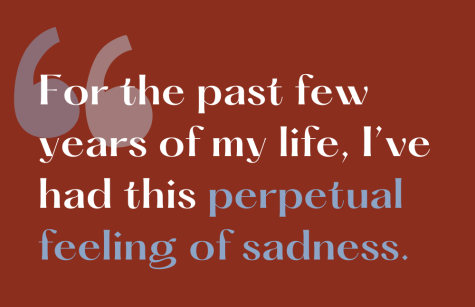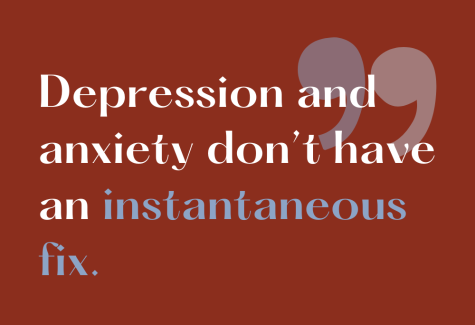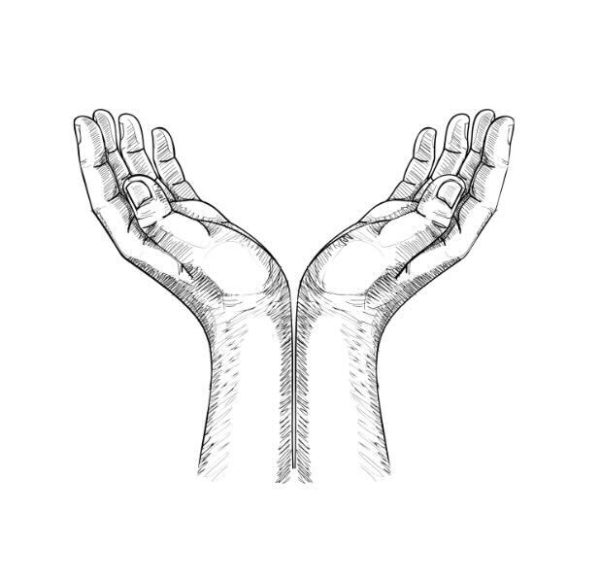Living with depression and anxiety
My experiences being diagnosed with mental health challenges
Content warning: This column discusses potentially sensitive topics like depression and anxiety.
Sprawled across the bed like I do every Saturday evening when my motivation is at an all-time low, I stare at my screen with a clenched jaw. Reading over my texts one, two, three times, something finally snaps in me and I hurl my phone to the side.
Water wells up in my eyes and as my frustration and anger build, I cave in and allow myself to cry. But it’s not like the sorrowful tears I wipe away while watching a sad movie, it’s full-on sobs that rack my entire body.
And of course, my mom chooses that exact moment to walk into my room and hand me a bowl of fruit. Catching sight of the undeniable streaks running down my face, her expression morphs into worry and like any mother would, she inquires about what’s wrong.
At her question, all the emotions I’ve kept pent-up for months come tumbling out, and she just hugs me and listens.
 For the past few years of my life, I’ve had this perpetual feeling of sadness. Most people, I presumed, felt happy or sad from time to time, of course, but most of the time they were just … neutral. Yet for me, even when I was doing something obsolete like just walking to class or scouring the fridge for food, I felt miserable.
For the past few years of my life, I’ve had this perpetual feeling of sadness. Most people, I presumed, felt happy or sad from time to time, of course, but most of the time they were just … neutral. Yet for me, even when I was doing something obsolete like just walking to class or scouring the fridge for food, I felt miserable.
When we returned to in-person learning at the beginning of this school year, my feelings of negativity were amplified and now, overwhelming.
I despised getting up in the morning and getting ready for school, and whenever I laid in bed for a break, I couldn’t bring myself to get up for hours. I found myself dreading social interaction much more — everything I said to other people in conversations would play through my mind like a broken record, and I’d beat myself up for it when I wasn’t occupied by something loud enough to drown out my thoughts.
As my general well-being worsened and permeated into other aspects of my life like my relationships and academics, I took the initiative to talk to a school therapist about how I was feeling. But despite the support, meeting with them once or twice wasn’t enough to make me feel better, and I felt like I couldn’t receive consistent therapy and prioritize my emotions until I was done with all the work I had to do.
In that manner, having that breakdown in front of my mom helped her and my dad realize that I was really struggling — something I’d failed to communicate with words for years. With their help, I was able to schedule an appointment with a psychologist through our health insurer.
However, because of how busy our healthcare provider was, it took a month and a half for me to talk to a licensed professional about my feelings, and I realized that having such irregular therapy sessions wouldn’t work for me.
As first semester drew to a close and my final college deadlines neared, I found myself with less and less energy to do anything, and most days, I would sleep for hours when I got home, completely neglecting my work. My temper worsened and my mind would constantly conjure up self-deprecating thoughts, leading me to, for a lack of better words, hate everything about myself.
My problems extended to my relationships too — I grew increasingly annoyed with things my friends said but refused to confront them about it and rather isolated myself. I knew that my relationships were being irreparably damaged, but I couldn’t be bothered to fix them when I already had so many problems myself.
Once I submitted my college applications and the new year rolled around, I hoped that somehow, my problems would dissipate into thin air. Yet of course, that wasn’t the case, and I only felt worse with every day that passed.
In mid-January, I had my second appointment with the psychologist and at the end of our meeting, he said something that seemed to explain my feelings of negativity and pessimism perfectly.
“You have depression and anxiety.”
Having those words slapped onto what I’d been experiencing made sense. It felt validating to be told that I was experiencing genuine medical problems, as opposed to being dramatic and making a big deal out of everything.
Following the psychologist’s advice, I met with a psychiatrist who affirmed the diagnosis based on my symptoms, and suggested the possibility of antidepressants to help with some of the biological bases of the disorders.
That’s when I ran into another problem — telling my parents that I had depression and anxiety. After my initial breakdown in the beginning of the school year, they were more perceptive of my feelings and knew something was going on, but they didn’t pry.
It was a rather awkward conversation for us to have, especially given the environment my parents were raised in, where mental disorders were regarded as taboo. But this talk was the start of me opening up more and relying on them instead of bottling things up.
Even at MVHS, many students don’t fully comprehend the severity of mental illnesses — I hear people throw around the word “depressed” or say things like “I want to kill myself” offhandedly. However, dealing with depression and anxiety for the last few months has helped me realize the impact of mental disorders and how they can tear your life apart — they can’t and shouldn’t be boiled down to jokes.
 And maybe, more of us at MVHS do have poorer mental health than we think. I did what a lot of other students seem to do — push aside mental health to focus on work. However, I’ve come to realize that ignoring your problems only exacerbates them.
And maybe, more of us at MVHS do have poorer mental health than we think. I did what a lot of other students seem to do — push aside mental health to focus on work. However, I’ve come to realize that ignoring your problems only exacerbates them.
Despite the progress I’ve started to make by going to therapy and taking medication, it’s still frustrating sometimes when I realize that depression and anxiety don’t have an instantaneous fix. It takes time and effort on my part to work on myself, and then my relationships with others.
But through my experience being diagnosed, I’ve learned that talking about my problems with the people who are there for me is a crucial first step.
—
How to Seek Help:
1. National Suicide Prevention Hotline Lifeline — HOTLINE NUMBER: (800-273-8255)
2. Anxiety and Depression Association of America — https://adaa.org/
3. SAMHSA: Substance Abuse and Mental Health Services Association — https://www.samhsa.gov/find-help/national-helpline | HOTLINE NUMBER: (1-800-662-4357)
4. NAMI: National Alliance on Mental Illness — https://www.nami.org/Home
5. DBSA: Depression and Bipolar Support Alliance — https://www.dbsalliance.org/
6. American Counseling Association — https://www.counseling.org/knowledge-center/mental-health-resources/anxiety







